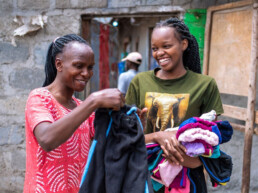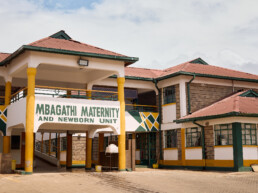The Challenge
Adolescent girls living in Kenya’s informal settlements face a unique set of challenges that make them particularly vulnerable to a range of negative outcomes, including poverty, limited access to education, early marriage, sexual and gender-based violence (SGBV), and an overarching lack of hope. Women experience the brunt of the challenges posed by the realities in informal settlements. Studies point to income disparities between genders, showing that the average income for women in Kibera, the largest slum in Kenya, is 42% lower than the income of men. Incidences of violence, discrimination against women, lack of basic needs, and inaccessibility to reproductive health products and services affect women and girls disproportionately.
These societal and cultural norms contribute heavily to teenage SGBV, young pregnancies, and cyclical GBV. According to UNICEF, approximately 23% of Kenyan women are married before the age of 18 while nearly one in five girls undergo female genital mutilation.
The Solution
Creating Safer Learning Environments
We implement a holistic program designed to address the root causes of gender inequality while empowering adolescent girls to thrive. Our approach focuses on creating safer spaces and equipping girls with leadership and life skills. Through mentorship programs, digital outreach campaigns, and leadership development initiatives, we foster an environment where girls can confidently advocate for themselves and their futures. Engaging male allies and leveraging the SHOFCO Urban Network (SUN) allows us to challenge harmful gender norms and promote positive change within communities.
Our Unique Curriculum
We work closely with the community to identify the most vulnerable girls and provide them with access to a unique curriculum that equips students to excel academically, socially, and emotionally. Taught in our schools in Kibera and Mathare, the curriculum focuses on leadership development, socio-emotional growth, resilience, sexual and reproductive health (SRH), SGBV prevention, and goal setting. Students also participate in internships, and community service projects, gaining practical skills while strengthening their connection to their communities. Mentorship and leadership retreats provide ongoing support, ensuring students thrive both academically and personally. Students are paired with successful women in Nairobi who guide them through challenges and inspire confidence.
Addressing Financial Barriers
We remove financial barriers to education by covering costs beyond tuition, including uniforms, transportation, and school supplies, and fully funding secondary education for high-achieving students without external scholarships. For students attending schools abroad, we provide cultural and academic preparation to ensure a smooth transition and success in new environments. Beyond high school, we partner with universities in Kenya, Africa, and the U.S. to secure higher education opportunities, with all of our U.S. high school graduates in 2022 earning scholarships to prestigious institutions like Columbia and Amherst.
The Outcomes
Short-Term
- Expanded educational support for vulnerable girls, including teen mothers, through bursaries, school supplies, and transportation, resulting in higher retention rates and improved test scores.
- Enhanced access to sexual and reproductive health resources, menstrual materials, and clean, reliable water paired with hygiene education, supporting adolescent girls’ health and well-being.
- Strengthened community engagement to address harmful gender norms, with active male gender champions and SGBV leaders heading local advocacy efforts.
Medium-Term
- Higher academic achievement and completion rates among girls in primary and secondary education, with increased socio-emotional resilience and confidence.
- Reduction in teen pregnancies, child marriages, and SGBV, fostering safer and more equitable community environments for girls.
- Schools and local institutions implement inclusive gender-equity policies, improving sanitation, menstrual health management, and supportive practices.
Long-Term
- Improved human capital, with high employment rates, increased earnings, and safer schools with better learning environments.
- Empowered girls and protective communities, with increased agency and employment, better education and SRH outcomes, reduced SGBV and teen pregnancy, and stronger community protective actions.
- Improved dignity and fewer diseases, with better education and work attendance, reduced illnesses and deaths, and a self-reinforcing increase in the dignity of sanitation.
The Impact
2.5k
young women provided with daycare support to enable participation in SHOFCO’s livelihoods, entrepreneurship, and financial literacy trainings
100%
of SHOFCO educated students matriculate to high school
75%
of SHOFCO students qualified for university


